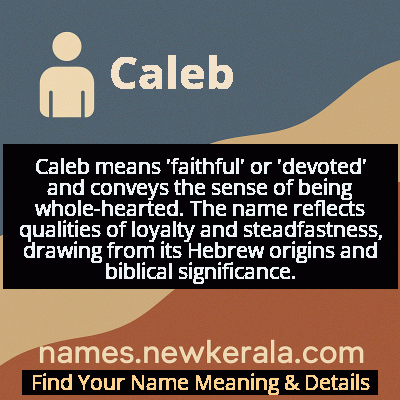Caleb Name Meaning & Details
Origin, Popularity, Numerology Analysis & Name Meaning of Caleb
Discover the origin, meaning, and cultural significance of the name CALEB. Delve into its historical roots and explore the lasting impact it has had on communities and traditions.
Name
Caleb
Gender
Male
Origin
Hebrew
Lucky Number
5
Meaning of the Name - Caleb
Caleb means 'faithful' or 'devoted' and conveys the sense of being whole-hearted. The name reflects qualities of loyalty and steadfastness, drawing from its Hebrew origins and biblical significance.
Caleb - Complete Numerology Analysis
Your Numerology Number
Based on Pythagorean Numerology System
Ruling Planet
Mercury
Positive Nature
Adventurous, dynamic, curious, and social.
Negative Traits
Restless, impatient, inconsistent, prone to indulgence.
Lucky Colours
Green, white.
Lucky Days
Wednesday.
Lucky Stones
Emerald.
Harmony Numbers
1, 3, 9.
Best Suited Professions
Sales, marketing, travel, entertainment.
What People Like About You
Versatility, charisma, adventurous spirit.
Famous People Named Caleb
Caleb from the Bible
Biblical Figure
Faithful spy who inherited Hebron for his devotion
Caleb Bradham
Pharmacist/Businessman
Inventor of Pepsi-Cola and founder of Pepsi-Cola Company
Caleb Deschanel
Cinematographer
Six-time Academy Award nominee for cinematography
Caleb Landry Jones
Actor/Musician
Cannes Film Festival Best Actor award winner for 'Nitram'
Name Variations & International Equivalents
Click on blue names to explore their detailed meanings. Gray names with will be available soon.
Cultural & Historical Significance
The name's cultural impact extends beyond religious contexts into broader Western culture, where it has been adopted as a symbol of reliability and moral strength. In American history, the name gained popularity among Puritan settlers who valued its biblical heritage and the virtues it represented. The enduring appeal of Caleb across centuries reflects its deep-rooted biblical heritage and the positive qualities associated with its original bearer, making it a timeless choice that bridges ancient tradition with contemporary values while maintaining its core meaning of faithfulness and devotion.
Extended Personality Analysis
Individuals named Caleb are often perceived as possessing strong, dependable characters marked by loyalty and determination. They tend to be natural leaders who approach challenges with courage and resilience, much like their biblical namesake who fearlessly advocated for entering the Promised Land despite overwhelming opposition. Calebs typically exhibit a balanced combination of practical wisdom and spiritual depth, making them both grounded and visionary. Their faithfulness extends to personal relationships, where they are known as devoted friends and family members who stand by their commitments.
While they can be strong-willed and assertive when necessary, they generally maintain a calm, steady demeanor that inspires confidence in others. This combination of strength and reliability makes Calebs particularly effective in positions requiring both leadership and trustworthiness. They often display a remarkable ability to remain composed under pressure and are frequently sought out for advice and guidance. Their inherent sense of responsibility means they take their obligations seriously, whether in professional settings or personal relationships, making them individuals others can consistently depend upon through both ordinary circumstances and challenging times.
Modern Usage & Popularity
Caleb has experienced a remarkable resurgence in popularity since the late 20th century, consistently ranking among the top 50 boys' names in the United States for the past three decades. Its appeal spans various demographic groups, appreciated by both religious families for its strong biblical connections and secular parents for its pleasant sound and positive connotations. The name maintains a contemporary feel while carrying historical weight, making it versatile across different cultural contexts. Its popularity peaked in the early 2000s but remains steadily favored, indicating enduring rather than fleeting appeal. The name's simplicity and strong phonetic structure contribute to its widespread acceptance, while its biblical heritage provides depth and meaning that many parents seek in name selection. Current usage trends show Caleb maintaining strong positions in English-speaking countries worldwide, with particular popularity in the United States, Canada, Australia, and the United Kingdom.
Symbolic & Spiritual Meanings
Symbolically, Caleb represents faithfulness in the face of adversity, courage against overwhelming odds, and the reward of steadfast devotion. The name evokes images of spiritual integrity and moral fortitude, drawing directly from the biblical narrative where Caleb's faith was tested and ultimately vindicated. Metaphorically, it suggests someone who remains true to their convictions even when standing alone, embodying the principle that faithfulness leads to inheritance and blessing. The name carries connotations of whole-hearted commitment, suggesting a person who gives their complete dedication to causes, relationships, and beliefs. In broader symbolic terms, Caleb represents the triumph of faith over fear and the importance of maintaining perspective when others lose hope. It symbolizes the idea that true strength comes not from physical power but from unwavering conviction and spiritual resilience, making it a name that inspires both the bearer and those who encounter it to approach challenges with courage and integrity.

